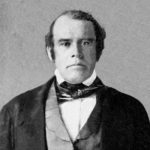
Can Latter-day Saints Use Birth Control?
Delving into the Church’s history on the topic of birth control can get sticky.
With just a quick internet search, it is clear that the issue leaves room for varying opinions among church members. So is using birth control a sin? Let’s talk.
Be fruitful and multiply

As Latter-day Saints, we believe that the family is central to God’s plan, so naturally, having children to raise in righteousness has been encouraged throughout church history by apostles and prophets.
In Genesis 1:28, we read that our first parents, Adam and Eve, were commanded to “Be fruitful and multiply and replenish the earth.” Members of the Church today have been commanded to do the same.
Brigham Young teaches that “there are multitudes of pure and holy spirits waiting to take tabernacles, now what is our duty?— to prepare tabernacles for them… it is the duty of every righteous man and woman to prepare tabernacles for all the spirits they can.”
Elder Christofferson teaches that “God ordained that men and women should marry and give birth to children, thereby creating, in partnership with God, the physical bodies that are key to the test of mortality and essential to eternal glory with Him.”
Modern-day guidelines

The current church website states:
“Husband and wife are encouraged to pray and counsel together as they plan their families. Issues to consider include the physical and mental health of the mother and father and their capacity to provide the basic necessities of life for their children.
Decisions about birth control and the consequences of those decisions rest solely with each married couple. Elective abortion as a method of birth control, however, is contrary to the commandments of God.
If you are married, you and your spouse should discuss your sacred responsibility to bring children into the world and nurture them in righteousness. As you do so, consider the sanctity and meaning of life. Ponder the joy that comes when children are in the home. Consider the eternal blessings that come from having a good posterity. With a testimony of these principles, you and your spouse will be prepared to prayerfully decide how many children to have and when to have them. Such decisions are between the two of you and the Lord.
As you discuss this sacred matter, remember that sexual relations within marriage are divinely approved. While one purpose of these relations is to provide physical bodies for God’s children, another purpose is to express love for one another—to bind husband and wife together in loyalty, fidelity, consideration, and common purpose.”
As shown, the Church’s current stance is that birth control is an issue between husband and wife and the Lord. I know people who feel birth control is not right for them, and I know many (including myself) who don’t hesitant to use birth control as a tool for family planning.
The Church clearly states that while sexual relations are for the “provid[ing] of physical bodies to God’s children,” another purpose is to “express love” and to “bind husband and wife together.” According to that statement, whichever way a couple decides to avoid pregnancy as a result of their personal intimacy should be left up to them.
The only form of birth control the Church states is “contrary to the commandments of God” is elective abortion. (it is important to note that the Church does not condemn abortion in cases of rape, incest, or when the life of the mother is in danger).
This means that the Church does not explicitly state whether or not an IUD is considered an abortifacient, etc. If you and your spouse decide that you will use birth control, it is important to be prayerful and diligent in your research to determine which type of birth control is right for you and your body. This could mean a variety of options, including abstinence during fertile periods, condoms, an IUD, or the pill.
Related: Does the Mormon Church have a position on when the spirit enters the body?
Birth control leads to damnation?

After reading snippets of statements by prophets past and present regarding birth control, it is clear that using birth control has become much more normalized in recent years.
For example, President Joseph F. Smith said:
“When young people marry and refuse to fulfill this commandment given in the beginning of the world—and just as much in force today—they rob themselves of the greatest eternal blessing. If the love of the world and the wicked practices of the world mean more to a man and a woman than to keep the commandment of the Lord in this respect, then they shut themselves off from the eternal blessing of increase. Those who willfully and maliciously design to break this important commandment shall be damned. They cannot have the Spirit of the Lord. Small families is the rule today. Husbands and wives refuse to take upon themselves the responsibilities of family life.
Many of them do not care to be bothered with children. Yet this commandment given to Adam has never been abrogated or set aside. If we refuse to live by the covenants we make, especially in the house of the Lord, then we cannot receive the blessings of those covenants in eternity. If the responsibilities of parenthood are willfully avoided here, then how can the Lord bestow upon the guilty the blessings of eternal increase? It cannot be, and they shall be denied such blessings. (Doctrines of Salvation, Vol.2, pp.88-89)
Keep in mind that this was in 1917 when the first Birth Control movement was in full swing. Those who promoted birth control were (and are even today) viewed as promoting promiscuity and free love rather than family planning. It is important to note that while of course there were, and are, people who used birth control for those purposes, the safe and effective birth control methods that are available today are the products of that time.
In regards to President Joseph F. Smith’s comments, perhaps directly applying his sentiments to our modern-day understanding of birth control and women’s health is counterproductive, but I feel as though there are valuable insights to glean from his statement:
- By choosing not to have children (or putting it off), we may be hindering ourselves from many blessings that come from starting a family.
- We shouldn’t let the way the world views starting a family dictate the way we personally view it.
- When it comes down to it, having children, if we are able, is a commandment from God that should be thoroughly discussed with your spouse. We should include Heavenly Father in our decision on when and if we will start a family.
The narrative begins to shift a few decades later. At a BYU devotional in 1983, President Gordon B. Hinckley said:
“I am offended by the sophistry that the only lot of the Latter-day Saint woman is to be barefoot and pregnant. It’s a clever phrase, but it’s false. Of course we believe in children. The Lord has told us to multiply and replenish the earth that we might have joy in our posterity, and there is no greater joy than the joy that comes of happy children in good families. But he did not designate the number, nor has the Church. That is a sacred matter left to the couple and the Lord.
The official statement of the Church includes this language: ‘Husbands must be considerate of their wives, who have the greater responsibility not only of bearing children but of caring for them through childhood, and should help them conserve their health and strength. Married couples should exercise self-control in all of their relationships. They should seek inspiration from the Lord in meeting their marital challenges and rearing their children according to the teachings of the gospel.”
While President Hinckley doesn’t condemn or condone birth control in his comments, he makes it clear that being constantly pregnant is not a woman’s only option. He clarifies that God has not designated a specific number of children modern-day Saints are expected to have, and that couples are directed to “seek inspiration from the Lord” in this matter.
Related: Please Don’t Ask Me When I’m Having Kids
Don’t Judge

While the Church is definitely pro-family, ultimately, it is your choice how many children you will have and when you will have them. It is important to refrain from judging fellow Saints for their opinions on the matter, as it is quite a private one. Just like your choice on when or if you will serve a mission or how much money you will donate to fast offerings this month—it is between you and the Lord.









